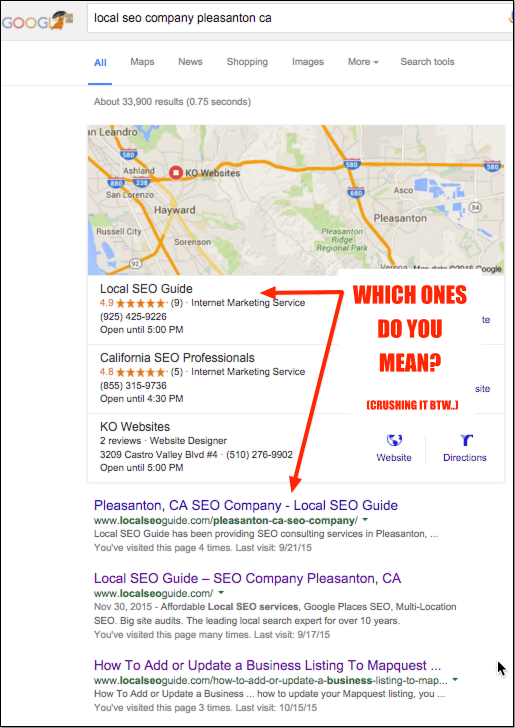Why Local Rank Trackers Fail
Columnist Andrew Shotland finds most local ranking solutions to be lacking for a number of reasons. Is there any way to solve this problem?
Hey, rank trackers! You know I love you guys, but let’s face it — your local rank tracking is a fail. This Twitter thread says it all.
I’ve got nothing against any of you, but I am hoping this rant will spur some of you on to solve this problem. Hey, maybe you already have, and I just don’t know about it. Hit me up, and I’ll get SEL to cross this whole thing out and put a nice juicy link to your site at the top with anchor text = “best local rank tracking software.” (Editor’s note: This is not going to happen.)
For local search marketers — and if you have been following the evolution of mobile search, you know we are all on our way to becoming local search marketers — rank tracking can be helpful to both understanding the SERP landscape and communicating with clients. (I know, no one wants to report rankings to clients, but they all still seem to want them.)
There are a ton of Local Rank Trackers — our list of Local SEO Tools has 23 — but the process has become increasingly difficult as Google iterates on their technology.
The Problem(s) With Location-Based Tracking
Google likes to return local pack/maps results based on the user’s physical location; however, there is often a lot of wiggle room. Google always thinks I am one city over, for example.
On top of that, local organic results are not always driven by precise location targeting on GOOG’s end. So before we even start tracking, the data is a bit fuzzy. Par for the course in Local.
Now consider that these tools are generally designed to track rankings in markets where a business is physically located. This presents a huge problem for service area businesses that may be attracting customers from dozens of cities. How about a business where customers will travel greater distances (like to get a great deal on the exact car they want)?
These businesses generally have to pay a significant amount of money for enough credits to cover all of their “markets,” and then they usually have to track all these areas as separate locations. That means a single plumber may need several “locations” in a rank tracker just to properly track search results in their target markets.
Now imagine how this works when you have 1,000 locations. On second thought, let’s not.
What Do You Mean When You Say “Local Rankings?”
When you say “local rankings,” do you mean local organic rankings, or are you talking about local pack rankings?
Or maybe you mean Google Maps? And what about Apple Maps? How do you factor one-boxes, local Knowledge Graph results and combined local/organic results into you tracking? Oh yeah, and let’s not forget about mobile SERPs and app indexing. And how do you report this mess?
Tracking Frequency Vs. Ranking Volatility
We all know that search rankings are incredibly volatile, so how do you separate the signal from the noise?
Some rank trackers track daily, because they want you to have a complete data picture, but that includes a lot of noise that is difficult to sort out. This is especially true of multi-location brands where daily tracking across hundreds (or thousands) of locations becomes an impenetrable abyss of “big data” that needs significant analytical skill and time to sort out.
If you try to cut through the noise by using weekly tracking, then you are only looking at a slice of the whole picture that may omit important movement based on days of the week.
It’s basically a given at this point that user behavior influences search rankings, so your business vertical may be specifically prone to these fluctuations; that’s another variable that drives your average multi-location brand analytics guy to break bad.
Tracking Technology
Part of the problem with local rank tracking is that there are several different ways to do it (a long but interesting discussion).
Minor differences across rank tracking methods may cause you to see different results from those your client sees — or worse, your CEO, who knows nothing of rank tracking issues…
This is not exclusive to local rank tracking, but how many times have you had a client complain that they don’t see their site ranking for a certain keyword when your tool says they do?
The Data Aggregation Problem
On top of all these problems, if you’re an agency or multi-location business that needs to aggregate data to track performance, then you have a whole other set of headaches:
- How is all the data aggregated by default?
- How can you get the data aggregated with a custom agreement (aka more $)?
For instance, say a multi-location national brand has 300+ separate websites for their different locations. There are some enterprise-class rank tracking solutions that don’t do a good job at rolling up hundreds of different websites (You know who you are, guys).
Meanwhile, other rank trackers may be able to roll up hundreds of websites, but they aren’t designed to break out reports at the local keyword or regional level (And you know who you are).
This is further complicated when you are talking about rankings in areas where a business isn’t physically located, as you will need to roll up these areas to the “location” level and then roll them up to your higher levels of aggregation. I just wrote that, and I’m not even sure what it means.
Epilogue
It’s easy to complain, but that’s just because there’s so much to complain about. Someone, please fix this, and on your deathbed, you just may receive total consciousness. #gungagaloonga
Opinions expressed in this article are those of the guest author and not necessarily Search Engine Land. Staff authors are listed here.
Related stories


